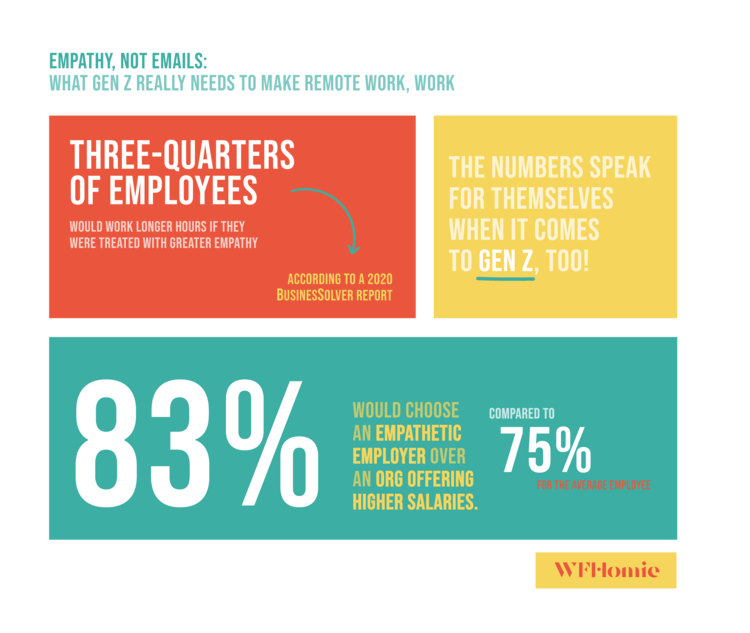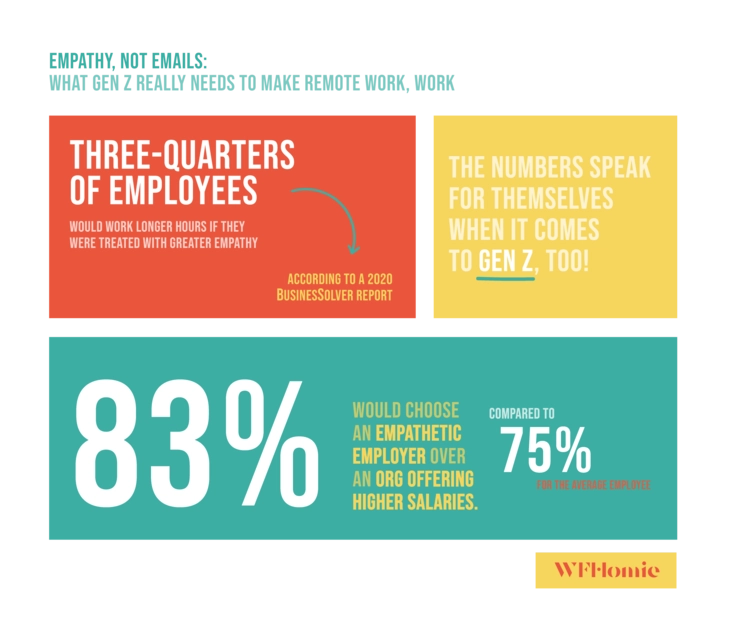What Gen Z Really Needs to Make Remote Working Work
It’s no secret that working remotely has brought on new challenges — and benefits — for knowledge workers of all age groups.
by CJ Cowan - June 15th, 2022
Cultivating empathy for younger employees can seem daunting to remote leaders. Whether due to intergenerational differences or the pitfalls of remote work, empathy for Gen Z teammates might sound like a maze you just don't have time for. But there is no disputing that the ability to see the world from another's point of view will always be worth investing in.
Empathy helps us understand why other people do what they do. Although empathy comes more naturally to some leaders, it's a skill that can be refined just like any other — and an extremely attractive one. Research shows that empathetic organizations enjoy "stronger collaboration, less stress, and greater morale." Or as the CEO of Microsoft puts it, "Without empathy, it is not possible to get the best from your team, so for this reason, it is the key to everything."
Empathetic behavior makes your team feel valued and heard; it fills an essential emotional need for your people. So crucial that three-quarters of employees would work longer hours if they were treated with greater empathy, according to a 2020 BusinessSolver report. The numbers speak for themselves when it comes to Gen Z, too! In the same survey, 83% said they would choose an empathetic employer over an Org offering higher salaries, compared to 75% for the average employee.
 So, what challenges keep team leaders from being empathetic to younger workers remotely? And what can they do about it?
So, what challenges keep team leaders from being empathetic to younger workers remotely? And what can they do about it?
First off, there's (obviously) the age gap. Gen Z has inside jokes, cultural reference points, and social norms, which can lead to some confusion at work. For instance, though young professionals' texting habits have often been overblown, it can be difficult for them to strike the right tone through Slack messages and emails — leading to a 'one emoji away from being fired' feeling. Conversely, it's also harder for younger workers to interpret their colleagues' communication.
When I interviewed Emily, who worked for Arrive at RBC Ventures last summer, she highlighted how "so much" of remote work revolves "around your communication." At first, she says, "I struggled to see the tone of communication. If somebody just messages you on Slack, it can be hard to tell if they're joking or if they're being serious."
Remote managers can improve communication at work by clearly clarifying the social norms, values, and expectations of their organization. It's not about giving younger teammates a set of Slack rules but rather ensuring that they know what regular communication looks like for their peers. Remember, your newest addition to the team has no clue what you say behind the scenes or how workplace interaction would occur in an office. Putting yourself in their shoes means recreating the same confusion they might be experiencing — and acting on it. If you don't have a set of communication guidelines, build one. And if you have one, advertise it. Chat about it in meetings, pin it on Slack, or give it a special home in Notion.
Ideally, your guidebook should answer these questions: Where does over-overcommunication begin? What does each teammate's writing style look like? One idea might be to create a message mood board for each colleague so your younger people can stop wondering who's formal, who's stiff, and who's mad at them. Other questions might include: What does 'professional' mean for your team?
And is there a difference between 'formal' and 'professional'? To answer these, try including some of your Slack messages and email screenshots as examples. Ultimately, your guidelines should be a yardstick for younger employees, so they can stop second-guessing themselves and get to know you instead. Beyond communication, another challenge keeping remote leaders from empathizing with young professionals is truly considering their life outside of work.
Younger teammates' struggles do not revolve around elderly parents, children, or mortgage payments. If anything, they're more often preoccupied with studying, side hustling, living alone, or sharing cramped spaces. Take Hannah, who interned at RBC Technology & Operations this summer. She told me how hard it was to focus in a "pretty small" apartment.
Even as she spoke about not having a private workspace, I could see family members moving in the background behind her. Worse still, her leisure spaces and workspaces looked identical. "Every wall in this apartment is the same color, and that doesn't help at all," Hannah added with a hint of a smile.
Meanwhile, Harneet, who's recently joined Hamilton Health Sciences, says it's been harder to maintain her archetypal "Okay, gotta grind!" attitude away from the office. It's the special work-from-home and pandemic cocktail that's hurt her social bonding time — but also her motivation. Before Covid, Harneet enjoyed going to the gym rather than working out at home. And "When I was studying, I preferred to do it in the library because I found it more motivating to see everybody else studying."
Losing the school campus atmosphere this year has enormously impacted young professionals everywhere in ways remote managers don't always consider. Now, it's become more challenging for Harneet to recreate the social pressure and community spirit she finds essential to building up her motivation, just like most recent college graduates.

These struggles can translate to a lack of motivation and energy and exceptionally blurry work-life boundaries at work. I discussed the latter with Tess, who's been interning at the Carter Center while studying full-time. She thought of personal scheduling habits as her saving grace: "I have classes, I have to get this thing done for my internship before my class, and the only thing I can think of [to make it work] is setting personal deadlines." Otherwise, she says, the relative flexibility of her multiple commitments might lead to unproductive, continuous multitasking.
And though it's been going great for Tess, some weeks are more complicated than others, given the irregular workflow of the school term. She'd said about the past week, "I've been having a tough time. I have so much schoolwork, and all this work, and it just got overwhelming."
"I've been having a tough time. I have so much schoolwork, and all this work, and it just got overwhelming."
— Tess
Taking breaks is a recurring struggle for younger employees, exacerbated by their (past and present) study habits. One could say that studying doesn't feel like studying, and the breaks don't feel like breaks. When joining the workforce remotely, young professionals can easily recreate this tendency to overexert themselves given irregular schedules.
Jad, who interned at the United Nations Human Rights Department remotely this summer, comments on "the grayness of when the work started and ended… If you're in an office, you come in; that's when you start working. And when you leave the office, you stop working." Remote work isn't as clear-cut, and younger employees keen to prove themselves don't want to take it too easy. "I feel I'm letting down my team if I take a break," Hannah told me, "because I know they're working, and I want to be working too. I don't want to attend a meeting with less than everyone else." The solution is not just telling your team to take breaks but also helping them enshrine their breaks into their day by design.
That's when empathy comes into play. Younger workers suffer the most when the support and encouragement are impersonal or even aloof. Though work-from-home challenges are commonplace, they play out in distinct ways for younger employees, who'll feel even less inclined to tell you about it directly. Consider that each enjoyed a supportive, friendly environment at work, yet most didn't share their roadblocks with their managers.
For instance, each interviewee was cheerfully told to take breaks but didn't really — either because they broke their schedule or others broke it for them with impromptu tasks. A recurring pattern in my discussions of remote work struggles with young professionals was the lingering fear of judgment and a deep-seated desire to "do well." To quote a BBC interview, younger workers prefer to "be discreet, rather than being like, 'SOS. I need help constantly."
As a result, remote leaders should never underestimate the pivotal role one-on-one conversations with younger workers can play in boosting empathetic behavior. While the individual stories above may give you insights, the best way for you to help young teammates is to personally ask them how it's going (read: how it's going), what challenges they're grappling with at the moment, and what work habits they'd like to change. Express curiosity about their lives, and you'll reap the rewards.
"What helped me was meeting with my supervisor every two days," Jad says, "and chatting as a break. I would recommend that very much." He specifies that their one-on-ones often had nothing to do with work, and this "was a big part of making it seem like an actual normal job; it kept relationships more friendly and easy."
"The best way for you to help young teammates is to personally ask them how it's going (read: how it's going), what challenges they're grappling with, and what work habits they'd like to change."
These personal meetings are a great way to develop empathy and build trust with younger workers. It helps them feel comfortable sharing their struggles without fear of losing face and makes them feel genuinely appreciated. Harneet, whose remote manager has one-on-ones with her every week, shares how empowered she feels after each of their calls. "I feel so l heard and like I have a voice. And I'm like, 'I'm okay, I'm okay here.' It changes your experience and how you feel on that team. It's just so important."
If you already have weekly check-ins with younger members of your team, make use of your discoveries. You should build upon your increased empathy to improve your younger workers' experience. If they're studying on the side, ask about assignment due dates and exam times to account for those when delegating. Work with them to find their sweet spot in flexibility; clearly, too much of it can harm some younger teammates. And make sure you find ways to boost their motivation through social interaction and team-building activities!
If anything, your efforts will show you that there is still much more to learn from your younger teammates. Because if "the single biggest problem in communication is the illusion that it has taken place," I would argue the same for empathy.
Recommended Posts
Young, Fun, & Remote: How Gen Z Is Bringing Fun to Work
Blog Articles
Happy Hires: What Matters When Onboarding Gen Z Remotely
Blog Articles
Search...
Product
GoCo
Resources
Articles
eBooks
Webinars
Customer Stories



